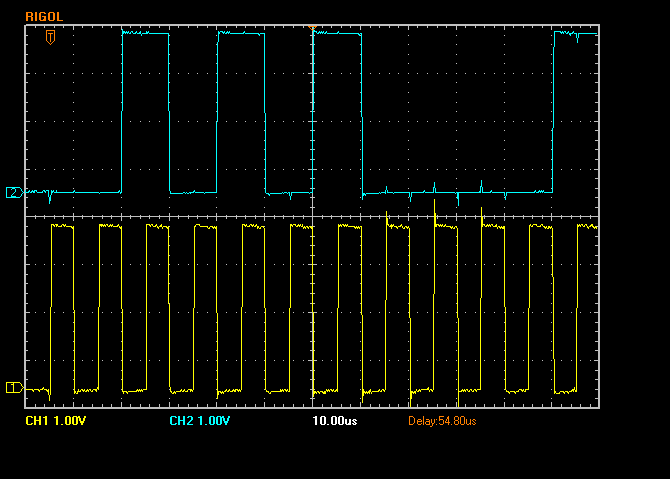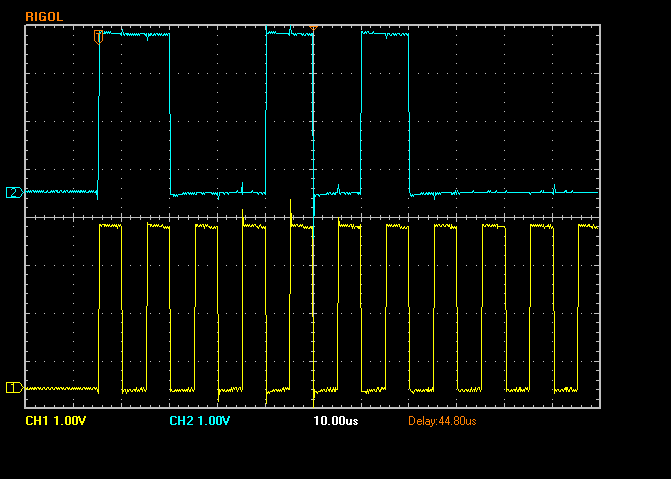SPI Pins for the Omega2
-
So here's a capture of CLK and MOSI from "spi-tool write 0xaa 0x11":

Upper trace is MOSI, lower trace is CLK, aligned to the vertical grid (10uS). You see the CLK leading-edge transitions are in the middle of the data - it all looks right except the first '1' bit is missing (far left, the first clock transition occurs while MOSI is 0).
This is "spi-tool write 0xca 0x11":

So here, MOSI starts with an abbreviated '1' bit, only about 1/2 as long as it should be, though the rest of the data timing is correct.
There are two problems:
- list itemWhen the first two bits are '10', the leading '1' is completely not sent by the SPI peripheral.
- list itemWhen the first two bits are '11', the leading '1' is about half as long as it should be.
This makes me think something is amiss with the SPI peripheral - perhaps some timing in the MT7621 SPI driver?
-
Oh - a known bug in the MT7688:
-
I noticed this bug myself, too, though I wasn't entirely sure, if it was something I did wrong with my custom images. Then I got distracted with other things in life and forgot to investigate this further. Anyways, if someone wishes to test, I compiled custom images for Omega2 and Omega2+, that include a patch for the SPI-stuff -- both images and a good bunch of various kernel-modules can be found inside https://dl.dropboxusercontent.com/u/11811685/omega2-stuff/omega2-spi-test.tar.bz2
I don't have many SPI-devices to test with, nor do I have a logic-analyzer to look at the output with, and besides, I'm quite occupied with other stuff at the moment, so I can't test how/if SPI works any better now. If someone here does get around to testing the images, I would appreciate hearing about the results. My images work similar to the official ones, ie. it sets up an AP on first boot and such, and you can use a web-interface to configure it. Don't forget to flash with
sysupgrade -n /tmp/image.bin-- has to be in /tmp and you should use the "-n" flag.EDIT: I forgot to mention that I included various SPI-related tools in the image, so there's no need to install them from the repos.
-
@WereCatf Which patch did you use? I'm integrating and unit-testing the patch I found in the Mediatek Labs forum; same one?
-
@Dana-Myers114 Aye, that one, yes.
-
@WereCatf @WereCatf I'm fixin' to test that patch myself; any hints on generating the LEDE build? I'm rather hoping I can
a) Add the onion feed to feeds.conf.default with this line:
src-git onion https://github.com/OnionIoT/OpenWRT-Packages.git;omega2b) start with .config :
CONFIG_TARGET_ramips=y
CONFIG_TARGET_ramips_mt7688=y
CONFIG_TARGET_ramips_mt7688_DEVICE_omega2=yfollowed by make defconfig
After that, make menuconfig and select spi-tool + Python lib, then sysupgrade my test target. Is there any reason '-n' is required in the sysupgrade? I have a serial console anyway but I figure a regular sysupgrade ought to work OK if I make sure to include the Mediatek SoftAP driver from the onion feed.
Once I establish the baseline build works, I'll drop in the patched spi-mt7621.c source and
spin it.Any hints?
-
@Dana-Myers114 said in SPI Pins for the Omega2:
Is there any reason '-n' is required in the sysupgrade?
I just say it, because my builds don't include the proprietary WiFi-driver and so not all the config-files apply. It's easier to just reset all settings to default, so they don't cause any issues.
-
@WereCatf OK - I may actually get test bits tonight and report back. SPI slave target is an Atmel AVR (ATmega1284P at the moment, but I'll be shifting to an ATmega328PB as soon as SPI functionality is verified, though that really makes no difference).
Assuming the patch works - I suppose it's begging to be a pull request upstream, really rather not maintain my own fork of the base OS.
Thanks again.
-
@WereCatf I generated my own build (LEDE + Onion feed), incorporated berniwa's patch to spi-mt7621, and am pleased to report it's working for me so far (testing with both spi-test and pyOnionSpi). My SPI slave target is an Atmel ATmega1284P and I'm validating the behavior in the ATmega using a JTAG debugger.
I also flashed an O2+ with your provided image, and verified it with spi-tool. Of course, both of our patches include this warning:
if (t->tx_buf && t->rx_buf) { printk(KERN_ERR "The MT7621-SPI does not support full" " bidirectional SPI, only doing TX!"); }which generates arguably gratuitous chatter and probably ought to be removed (I'm removing it from my version of the patch).
I also validated larger than 16-byte transfers work correctly (I tested writes, since my slave device is currently very simple and doesn't talk back yet).
Pending a bit more testing, this patch seems like it ought to back upstream - would you consider doing the PR?
Thanks for the help!
-
@Dana-Myers114 Sounds promising! I was just planning to test it out myself today with a fancy little project and, if it works, I'll report back here and then possibly discuss the patch with upstream.
-
I really, really want a logic-analyzer for this stuff, god dammit.
-
@WereCatf said in SPI Pins for the Omega2:
I really, really want a logic-analyzer for this stuff
Basic cy7c68013a board and sigrok is a cheap, effective solution for moderate speeds
-
So, I just obtained a logic-analyzer a couple of days ago and I tried to get fbtft running on the Omega2, but it's a no-go so far. While the kernel-module itself technically works and I am seeing the expected data on the SPI-bus, the display doesn't work.
I took a capture from two other SBCs and the only meaningful difference I can see is that the Omega2 starts the SPI-bus clock and data-transfer immediately as it pulls the CS-pin low, whereas the other two SBCs pull CS-pin low, then wait 12 microseconds before starting the clock and data-transfer -- I have no idea, if this is a standard-procedure or if it is even the cause, but that's the only thing I can see, that jumps out at me.
-
@WereCatf presumably you've already confirmed the clock phase and polarity requirements of the display and that the MT7688 SPI is correctly configured? Are the other SBCs running the same bits (other than the SPI driver)?
-
@Dana-Myers114 Since it's fbtft that sets the clock-phase and polarity, yes, they are the same. I also specifically told it to use 500KHz SPI-bus speed, which the logic analyzer confirms as being in use.
-
I've finaly received an answer from Onion about that topic :
"The SPI issue we will be investigating as soon as we can, however due to the overwhelming success of our crowdfunding campaigns, it may not be very fast. We also recommend submitting an issue to our github repo - or even a pull request if you work out a fix!"
The discussion is a bit to advanced for me here, but if I can help, don't hesitate to ask.
Brice
-
@Brice-Parent I've got a patch that I apply in my own build; I suppose I could do a PR for it into the Onion repo, though I think it really should go upstream into LEDE/OpenWRT. Before doing a PR for that, I need to confirm that this issue is present in all MT7621-type SPI peripherals (not just in the MT7688 used in the Omega2) because it would patch all of them. Given that actual full-duplex operation is not possible with the patch, it is potentially a regression if there's a flavor of MT7621 SPI that actually does work (though I suspect that's not the case)
-
Anyone still have got the discussed Patch? Unfortunately the Page from where it is form isn't alive anymore.
-
@Dana-Myers114
Hi, I have a problem with spi-tool read function
it always return 0x00